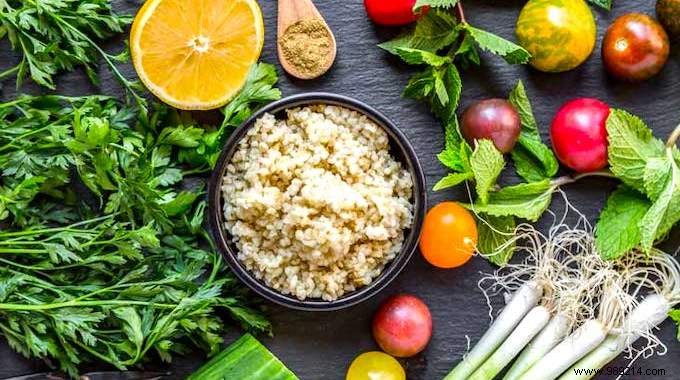
Many people think there are calorie foods negative .
Unfortunately, this is wrong! The calorie is a unit that measures the energy value of food.
Thus, there can't really be any "negative" calories.
But some foods contain so few calories that the energy needed to digest them is greater than the energy these foods bring to your body!
Thus, these "zero calorie" or "negative calorie" foods are perfect for losing weight and boosting your metabolism .
Zero-calorie foods make you feel full without the risk of weight gain , while providing essential nutrients.
Here is the guide to "zero calorie" foods to help you lose weight easily . Watch:

Click here to easily print the guide in PDF.
The idea is to slip these foods into your daily meals for a healthy and balanced diet.
And don't forget,moderation is the watchword!
Indeed, even though all the foods on this list are nutrient dense, consuming too few calories is just as bad for your health as consuming too many calories .
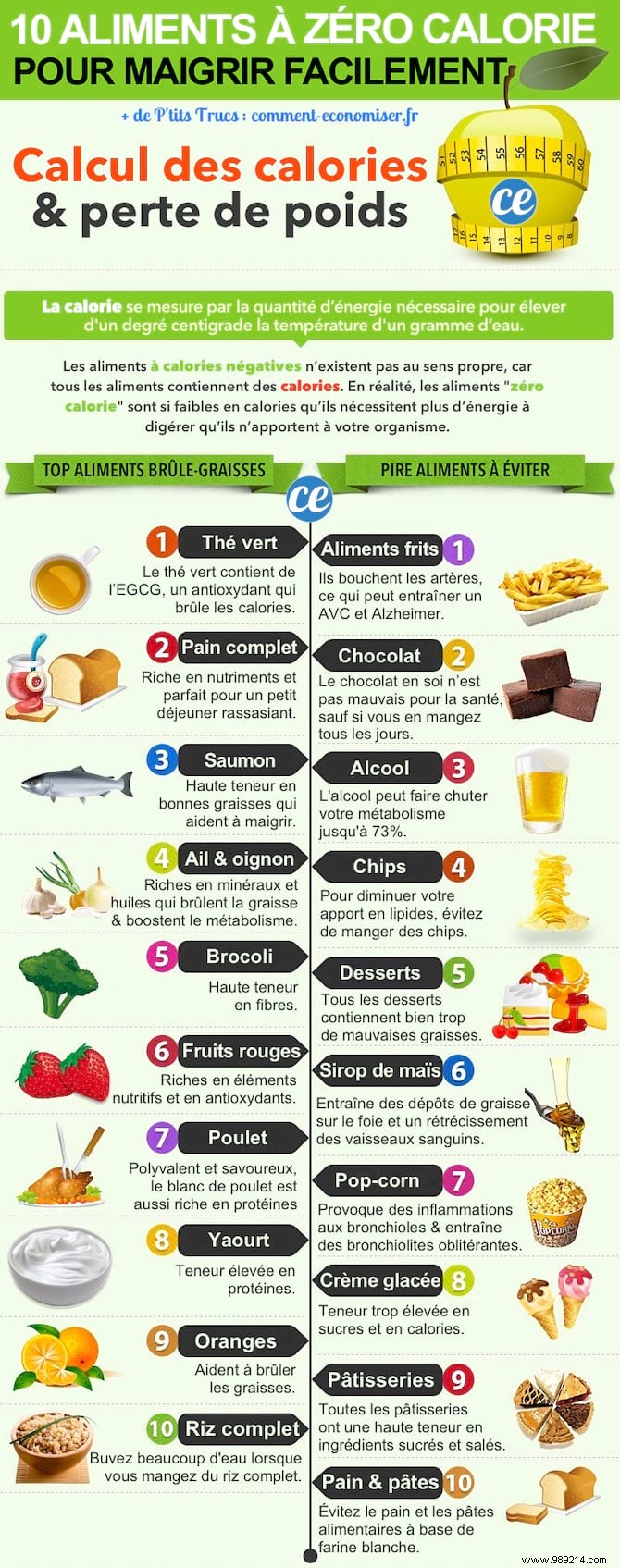
The calorie is measured by the amount of energy needed to raise the temperature of one gram of water by one degree centigrade.
Negative calorie foods do not exist in a literal sense because all foods have calorie content.
In fact, "zero calorie" foods are so low in calories that they require more energy to digest than they bring to your body.
Also, many people believe that in order to lose weight, you should avoid eating fruits because of their high sugar content.
But in reality, most fruits are very low in calories.
For example, garlic contains far more calories than watermelon, papaya and apples.
Green tea contains EGCG (epigallocatechin gallate), a calorie-burning antioxidant.
Rich in nutrients and perfect for a satiating and low GI (glycemic index) breakfast.
High content of good fats that help to lose weight.
Contains minerals and oils that burn excess fat and boost your metabolism.
High fiber content.
Rich in nutrients and antioxidants.
Versatile and tasty, chicken meat is also rich in protein (provided you don't eat the skin, which is very high in fat).
High protein content.
Help burn fat.
Remember to drink plenty of water when eating brown rice.
Fried foods clog arteries, which can lead to strokes and Alzheimer's disease.
Chocolate in itself is not bad for your health, unless you eat it every day.
Alcohol can cause your metabolism to drop by up to 73%.
To reduce your fat intake, avoid eating crisps.
Yes, all desserts contain way too many bad fats.
Causes fat accumulation, which leads to fatty deposits on the liver and narrowing of blood vessels.
Commercial melted butter popcorn causes inflammation of the bronchioles in the lungs and can lead to bronchiolitis obliterans.
Too high in sugar and calories.
All pastries have a high content of sweet and savory ingredients.
Avoid bread and pasta made with white flour.

- Asparagus: 25 calories per 100g
- Beet: 37 calories per 100g
- Cabbage: 21 calories per 100g
- Celeriac: 8 calories per 100g
- Garlic: 149 calories per 100g
- Eggplant: 15 calories per 100g
- Broccoli: 31 calories per 100g
- Cauliflower: 31 calories per 100g
- Cucumber: 10 calories per 100g
- Spinach: 25 calories per 100g
- Apple :52 calories per 100g
- Apricot: 241 calories per 100g
- Melon: 34 calories per 100g
- Grapefruit: 42 calories per 100g
- Watermelon: 30 calories per 100g
- Orange: 47 calories per 100g
- Blackberries: 43 calories per 100g
- Cranberry: 308 calories per 100g
- Papaya: 39 calories per 100g
- Raspberries: 52 calories per 100g
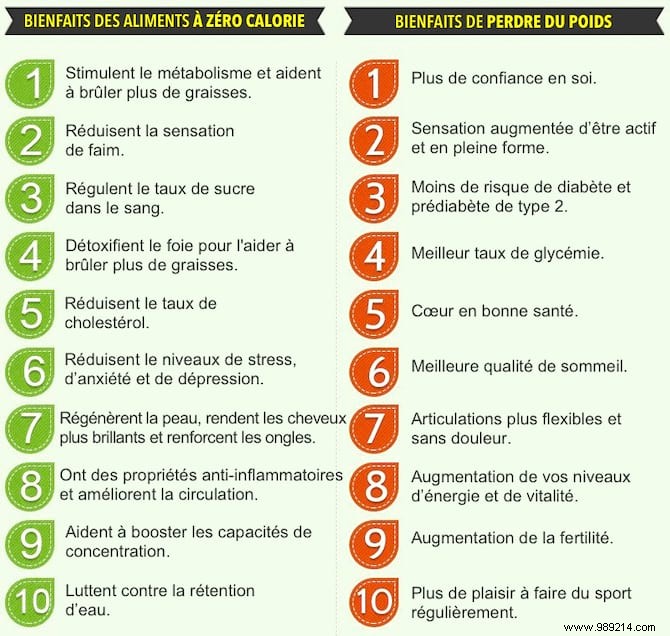
1. Boost your metabolism and help burn more fat.
2. Reduce your feeling of hunger.
3. Regulate blood sugar levels.
4. Detoxify the liver (the organ that burns fat) so it burns even more fat.
5. Lower your cholesterol levels.
6. Reduce your levels of stress, anxiety and depression.
7. Regenerates the skin, makes the hair shinier and strengthens the nails.
8. Has anti-inflammatory properties and improves blood circulation.
9. Help boost your concentration skills.
10. Fight against water retention.
1. More self-confidence.
2. Increased feeling of being active and in good shape.
3. Less risk of type 2 diabetes and prediabetes.
4. Better blood sugar level.
5. Healthy heart.
6. Better quality of sleep.
7. More flexible and painless joints.
8. Increase your energy and vitality levels.
9. Increase in fertility.
10. More pleasure in exercising regularly.
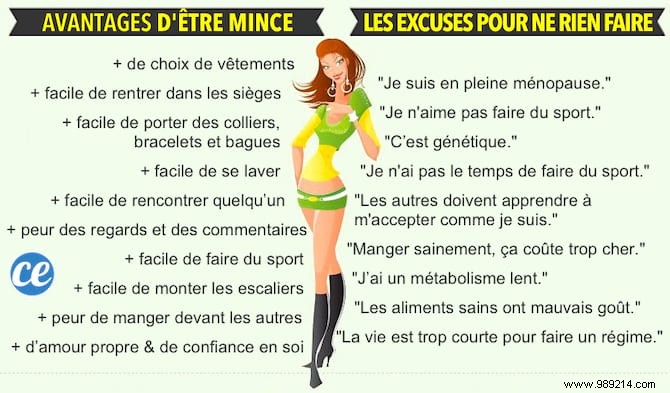
- More clothing options
- Easier to get into the seats
- Easier to wear necklaces, bracelets or rings
- No longer afraid of disapproving looks and comments
- Easier to meet someone when you are thin
- Easier to wash
- Easier to do sports
- Easier to climb stairs
- No longer afraid to eat in front of others
- Much more self-esteem and self-confidence
- "I'm going through menopause."
- "I don't like to play sports."
- "I don't have time to exercise."
- "Life is too short to go on a diet."
- "Others must learn to accept me as I am."
- "Healthy eating costs too much."
- "I have a slow metabolism."
- "Healthy food is not good."
- "It's genetic."
- "I take medication that slows down my metabolism."
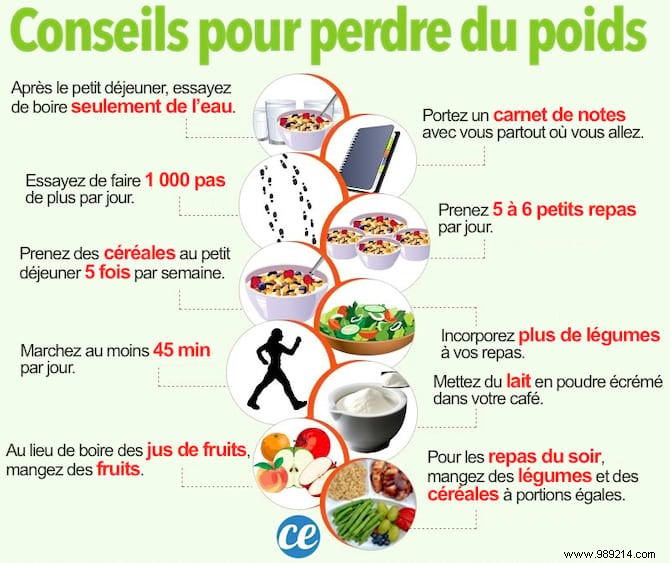
- After breakfast, try to drink only water.
- Carry a notebook with you wherever you go.
- Try to take 1,000 more steps per day.
- Eat 5 to 6 small meals a day.
- At breakfast, take cereal 5 days a week.
- Incorporate more vegetables into your meals.
- Walk at least 45 min a day.
- Put skimmed milk powder in your coffee.
- Instead of drinking fruit juice, eat fruit.
- For evening meals, eat vegetables and whole grains in equal portions.
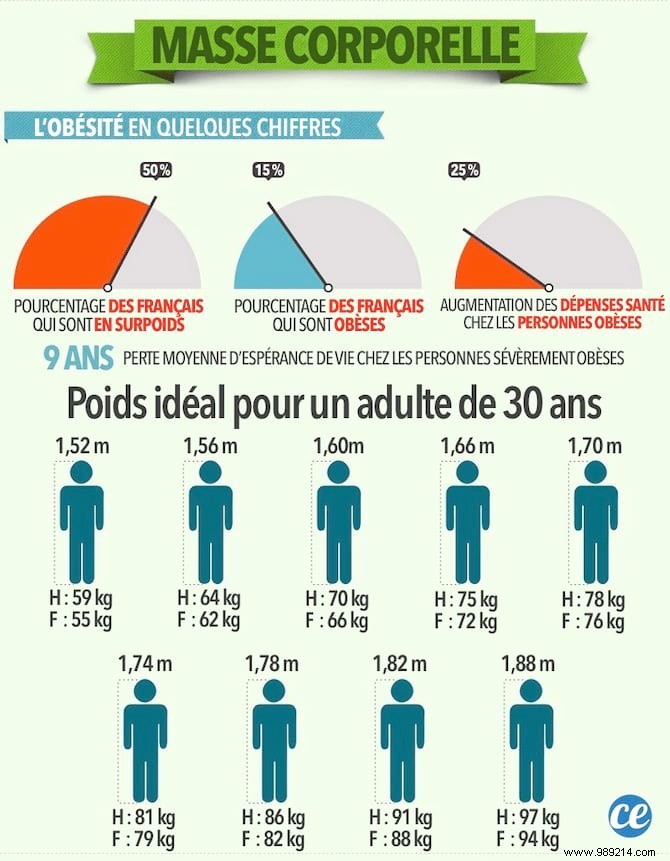
- 50%: percentage of French people who are overweight
- 15%: percentage of French people who are obese
- 25%: average increase in health-related expenditure among obese people
- 9 years old: average reduction in life expectancy in severely obese people
- 1.52m: 58.7 kg (male) and 55 kg (female)
- 1.56m: 64.4 kg (male) and 61.5 kg (female)
- 1.60m: 69.4 kg (male) and 65.8 kg (female)
- 1.66m: 74.5 kg (male) and 71.8 kg (female)
- 1.70m: 77.7 kg (male) and 75.8 kg (female)
- 1.74m: 80.8 kg (male) and 79.0 kg (female)
- 1.78m: 85.6 kg (male) and 82.4 kg (female)
- 1.82m: 90.6 kg (male) and 87.7 kg (female)
- 1.88m: 97.0 kg (male) and 94.4 kg (female)
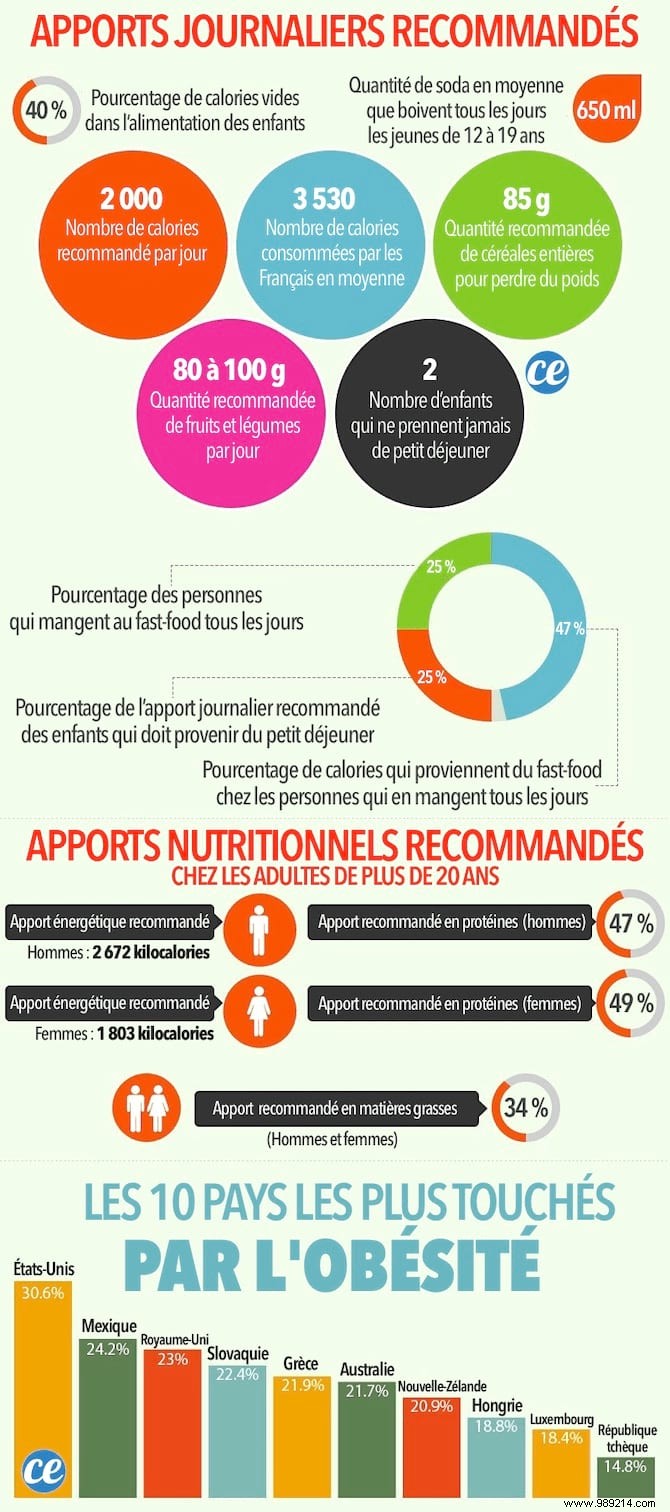
Recommended daily allowances:the key figures
- 40%: percentage of empty calories in children's diets
- 650ml: amount of soda that young people aged 12 to 19 drink each day, on average
- 2000: recommended number of calories per day
- 3,530: number of calories consumed on average by the French every day
- 85g: recommended daily amount of whole grains for weight loss
- 80 to 100g: recommended amount of fruits and vegetables, i.e. 5 per day
- 2: number of children who never eat breakfast
- 25%: percentage of people who eat fast food every day
- 25%: percentage of recommended daily allowance
children who must come from breakfast
- 47%: percentage of calories that come from fast food among people who eat it every day
- Recommended energy intake (for men): 2,672 kilocalories
- Recommended energy intake (for women): 1,803 kilocalories
- Recommended protein intake (for men): 47%
- Recommended protein intake (for women): 49%
- Average fat consumption (men and women) :34%
1. United States: 30.6%
2. Mexico: 24.2%
3. United Kingdom: 23%
4. Slovakia: 22.4%
5. Greece: 21.9%
6. Australia: 21.7%
7. New Zealand: 20.9%
8. Hungary: 18.8%
9. Luxemburg: 18.4%
10. Czech Republic: 14.8%
Have you tried the zero calorie food guide to losing weight naturally? Let us know in the comments if it worked out well for you. We can't wait to read you!